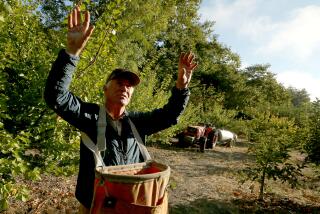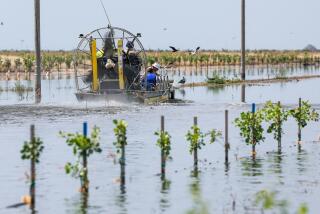Tasting Fruition in a Bitter Harvest : Lifestyles: Farmer David Mas Masumoto has an acclaimed new book about his struggles to raise a delicate variety of peach. Last week’s hailstorm shows just how delicate.
- Share via
DEL REY, Calif. — Fruit grower and writer David Mas Masumoto couldn’t wait for June to come. His first major book would be published--a chronicle of family, farm travails and his struggle to market an old variety of peach that tastes wonderful but has a short shelf life.
He also was going to harvest a promising crop and hope that it finally would find a way into the consumer’s heart, saving the old orchard from the bulldozer.
But last week, on the day “Epitaph for a Peach” hit the bookstores with high praise, a freak hailstorm pummeled the San Joaquin Valley and badly damaged the rare Sun Crest peaches that inspired his tale.
Masumoto was sitting on the porch overlooking his 80-acre farm when it struck: saucer-shaped hail that sliced through the fruit like tiny razor blades. Before the storm, a fruit broker captivated by his book had agreed to sell the entire crop, which was two weeks away from harvest.
On Monday, Masumoto, a third-generation Japanese American farmer, reconciled to the conceit of Mother Nature, walked softly through his orchard and tried to assess the damage:
“At the best I lost 20% to 30%. At the worst, 60% or 70%. It was going to be a good crop. I had almost let myself be optimistic. . . . Now my peaches may be homeless again.”
Hail in mid June is unheard of in this farm belt where the 100-degree days of summer could begin as early as this week. Like all storms, this one was fickle--delivering a hard blow to some areas and leaving others untouched.
A Mennonite pastor went farm to farm in nearby Reedley, giving what amounted to last rites to some harvests. The exact crop damage, which is still being calculated, may be in the tens of millions of dollars.
“At one point, the hail was coming in sideways,” Masumoto said. “I told myself, ‘This is not good. Mother Nature means business this time.’ ”
When the hail stopped, the 41-year-old Masumoto walked over to the adjacent farm where his 73-year-old father had been listening to the pelting inside a metal-roofed equipment shed.
His father, Tak Masumoto, who began farming in 1948 after spending four years in an internment camp, just shook his head. “I’ve never seen a storm like this in June,” he said.
For better or worse, the younger Masumoto knew then he had a little piece of history. “I realized that this storm was my story. And one day I’d be passing it down to my children and children’s children. . . . Not that it’s great news,” he laughed.
Masumoto’s gentle, wry voice has been praised by reviewers of his book, which details four seasons on his family farm. “This is language that feels like a breeze, or like fog on your skin,” read a recent review in The Times. “It smells like damp earth.”
The book began eight years ago as a lament for his Sun Crests, amber-golden peaches that taste truly sweet and juicy--qualities no longer appreciated by some fruit brokers and grocery chains.
The newer, lipstick red varieties may not taste like much, they concede, but they sure look nice on the shelf and keep long.
But Masumoto, who farms without using harsh chemicals, has refused to give in to business dictates and bulldoze a patch of 400 trees--all that remains of the original 15 acres of Sun Crests his father planted 30 years ago.
“You lean over the sink to make sure you don’t drip on yourself,” he writes lovingly of the fruit. “Then you sink your teeth into the flesh and the juices trickle down your cheeks and dangle on your chin. This is a real bite, a primal act, a magical sensory celebration announcing that summer has arrived.”
The fight to find a home for his peaches and stave off the bulldozer shapes the narrative. This year, capitalizing on the publicity surrounding the book, he thought he found a dependable buyer for his Sun Crests.
Now, in the wake of last week’s hailstorm, he’s not sure the broker who agreed to place them or, ultimately, the consumers, will accept a fruit gouged and nicked by nature.
“Things were looking good--the book, the crop--and then the hail,” he smiled. “I thought I had been initiated. But as I sat on my porch and watched it come slamming down, I told myself, ‘Here it comes. Another challenge. Another test.’ ”
More to Read
Sign up for our Book Club newsletter
Get the latest news, events and more from the Los Angeles Times Book Club, and help us get L.A. reading and talking.
You may occasionally receive promotional content from the Los Angeles Times.








